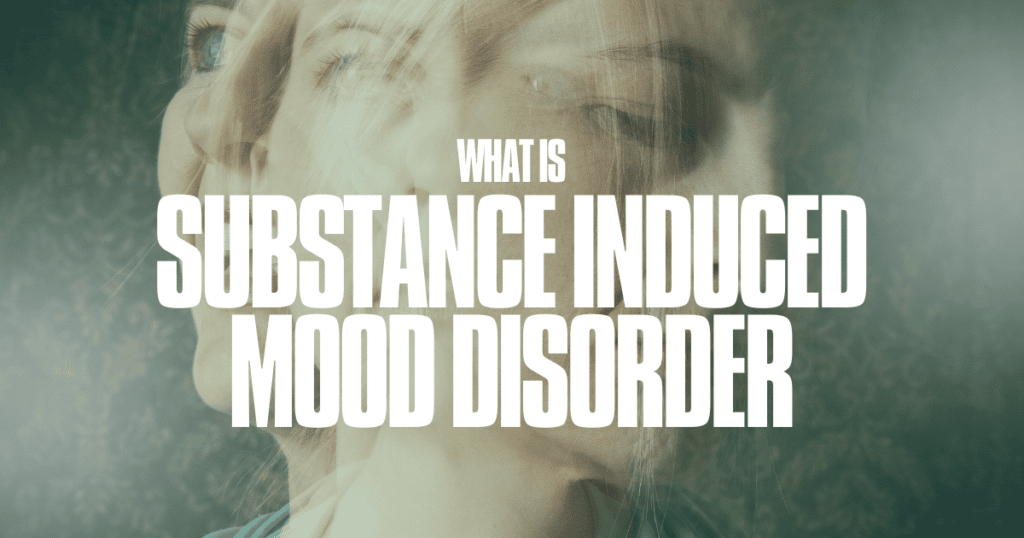Mood disorders are a type of mental health category. Mood disorders broadly describe conditions like bipolar and depression. One subtype is a substance induced mood disorder, which has a different underlying cause and can require unique treatment.
Below, we talk more about substance induced mood disorder, its implications for the symptoms you might experience, and how these disorders can affect your treatment plan.
Understanding Mood Disorders
A mood disorder is a serious mental health condition and mental illness, with the term broadly describing all types of bipolar and depressive disorders.
People of any age can have a mood disorder, but symptoms may differ in children and teens compared to adults. It’s more challenging for mental health professionals to diagnose a mood disorder in a child because they tend to have a harder time expressing their feelings.
The most common types of mood disorders are:
- Major depression leads to less interest in normal activities, feelings of hopelessness and sadness, and other symptoms lasting for two weeks or more.
- Seasonal affective disorder often occurs in winter, when the days are shorter, and someone has less exposure to natural sunlight
- Dysthymia is an ongoing, low-grade depressed mood lasting at least two years.
- Bipolar disorder leads to periods of depression that alternate with a higher mood, known as mania.
- Mood disorders can be caused by various other health conditions, including infections, chronic illnesses, injuries, and cancer.
- Substance induced mood disorder refers to symptoms of depression from the physiological effects of an illicit substance, alcohol, prescription medicines for medical conditions, exposure to toxins, or other types of treatment.
There are a lot of factors contributing to mood disorders outside of substance induced disorders. Many mood disorders can be caused by imbalances in brain chemicals or life events such as major changes that are stressful.
There are also familial and genetic components of mood disorders. For example, according to the American Psychiatric Association, one of the risk factors for depressive symptoms is having a family history in a close relative, such as a parent.
Anyone can experience times when they feel sad or depressed, but a mood disorder is more long-lasting and intense.
When you have a mood disorder, it’s more difficult to manage than typical feelings of sadness.
Symptoms of Mood Disorders
Common symptoms of mood disorders can include:
- Ongoing feelings of anxiety, sadness, or emptiness
- Hopelessness or helplessness
- Low self-esteem
- Feeling worthless or inadequate
- Feeling excessively guilty
- Lack of interest in activities once enjoyed, such as sex
- Problems in relationships
- Sleeping too much or too little
- Appetite or weight changes during depressive episodes
- Decreases in energy levels
- Problems focusing
- Physical complaints such as headache or stomachache
- Sensitivity to failure or rejection
- Irritable mood, aggression, or hostility
- Thoughts of death or suicide or suicidal ideation
- Significant effects on quality of life and daily activities
Treating Mood Disorders
When someone receives a diagnosis of a mood disorder or another psychiatric disorder, it can often be treated and managed successfully.
Treatment options tend to include medications such as antidepressants or mood stabilizers. Psychotherapy is also a form of treatment. Psychotherapy involves helping someone change their distorted views of themselves.
Cognitive-behavioral therapy is most commonly the type of psychotherapy used for mood disorders. CBT is also used to treat anxiety disorders and other mental health conditions.
Family therapy may also be part of a treatment plan, as can options like electroconvulsive therapy.
What is Substance Induced Mood Disorder?
There are many similarities between mood disorders and substance-induced depressive disorder or other mood disorders, but the biggest difference is the underlying cause.
Compared to other types of depression, the symptoms of substance induced mood disorders are caused directly by illicit drug abuse, alcohol, or medications. The official diagnostic name is substance/medication-induced depressive disorder.
Substance-induced depression isn’t the same as occasional feelings of sadness nearly everyone experiences. Instead, it’s more severe and lasts for longer. For some people, having a depressive disorder or a mood disorder stemming from substances can lead to a complete loss of interest or enjoyment in life.
There’s a paradoxical effect with a substance-induced disorder like severe depression. So often, people will take drugs to help them feel better, but those substances end up making them feel worse.
When a mental health care provider diagnoses a medication or substance induced mood disorder, they verify the condition wasn’t there before the use of the substance believed to be responsible.
That’s because there are many types of depressive disorders, and if the symptoms existed before the substance use, then the diagnosis wouldn’t be a substance induced mood disorder. These mental health disorders are independent of substance use.
A diagnosis of substance induced mood disorder won’t be given in most cases if someone’s symptoms continue for over a month after they stop using drugs, alcohol, or medications.
For a diagnosis to be made, the following should exist:
- The healthcare provider must determine if someone uses a substance or medication linked to a substance-induced mental disorder.
- Then, symptoms must cause significant distress or functional impairment.
- The symptoms must appear within a month of intoxication with exposure to or withdrawal from a substance or medication.
- The symptoms must not have occurred before the drug or medication use. For example, someone with a history of depression wouldn’t meet the diagnostic criteria or clinical features of a disorder stemming from substance use.
- The symptoms don’t just occur during active delirium associated with a medication or substance. For example, if the symptoms occur only when someone is in a state of severe intoxication, it may not qualify as a substance-induced disorder.
How Quickly Do Substance-Induced Mood Disorders Begin?
For some people, depressive mood disorder symptoms can start nearly immediately after using a substance. There’s a subcategory called “with onset during intoxication,” meaning the symptoms occur when someone is actually high on the drug. The symptoms can also start when someone withdraws from the drug.
It’s also possible for substance-induced psychotic disorders to occur during drug use or as part of withdrawal.
Which Drugs Cause Mood Disorders?
A wide variety of psychoactive drugs and substances can cause depressive disorders, especially in vulnerable individuals. Some of the more commonly recognized disorders include:
- Alcohol-induced depressive disorder
- Opioid-induced depressive disorder
- Sedative-induced depressive disorder
- Cocaine-induced depressive disorder
Depression disorders related to prescription medications include:
- Steroid-induced depressive disorder
- Antibiotic-induced depressive disorder
- Chemotherapy-induced depressive disorder
- Central nervous system drug-induced depressive disorder
How Does Substance Induced Mood Disorder Affect Treatment?
In most cases, in a true situation of a substance induced mood disorder, the symptoms will subside if someone stops their use of the substance or medication triggering it.
- People with more complex or severe symptoms may need supportive care as they go through withdrawal.
- Depending on the person and the situation, someone with a depressive disorder linked to substances might benefit from taking antidepressant medication during the time they’re going through withdrawal.
- People with mania triggered by substance use disorder might be prescribed antipsychotic medication for a period of time.
- Individuals with a mental disorder triggered by substance use might also benefit from family support or psychotherapy.
- Suppose the person is addicted to a drug creating depressive symptoms. In that case, they need to go through a formal detox program in many cases and also an addiction treatment program that will address their needs holistically.
- Many symptoms of a substance-induced mental disorder will resolve within a month after stopping the drug or substance causing them. Most people who can stop the exposure successfully will recover from their mood disorder.
Contact the Coastal Detox of Southern California treatment team today by calling 858-293-5301 if you’d like to learn more about how to detox from drugs or alcohol safely and effectively. We also work with people with any mood disorder, co-occurring disorders, or a medical condition such as clinical depression, whether triggered by drugs or when they were part of their pre-existing medical history.









